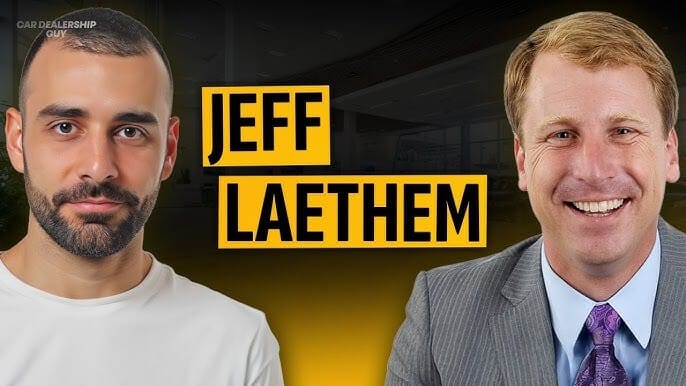
Presented by:
Hey everyone,
Quick reminder—we retired our old podcast request form to streamline how guests get featured across everything we do.
Now it’s just one link for everything: cdgguest.com
Whether it’s for the pod, the newsletter, the live show—doesn’t matter. If you’ve got a story worth sharing, that’s where to drop it.
Nominate a guest (or yourself) today.
First time reading the CDG Newsletter?
Welcome to The Breakdown, an analysis of auto retail’s top trends, moves, and insights—in under 5 minutes.

There’s one part of the used car process that’s still holding back profits: reconditioning.
(If you're new to this space, vehicle reconditioning is what happens after a dealer picks up a used car. It gets checked out, cleaned up, fixed if needed, and brought back to life so it’s ready for resale.)
It's not the sexiest part of the business, but it's a vital one that's not easy to pull off well.
Here's why (and how) top dealership operators are reengineering their recon strategies from the ground up, and turning the process into a true competitive advantage...

Reconditioning speed is impacting profitability more than ever.
Used vehicle profit doesn’t just happen when the car sells—the real gains come from the efficiencies applied long before a vehicle hits the front line.
But, newly acquired used cars often bounce around the dealership with no clear ownership, no real-time visibility, and no one accountable for keeping recon moving.
And the financial drag can be rough. Holding costs often run $45–$100 per car, per day. Multiply that by the average 5-7 days it takes to get these cars "retail ready" and it's clear how much dealers are leaving on the table.
That's an issue because as tariffs threaten to push new car prices up, more shoppers are turning to used cars instead. And production shortages from 2020–2021 mean fewer clean, late-model units are available.

Via Cox Automotive
So, customers are moving down-market into older cars that often need more recon work.
Leaving dealers to realign their processes around these realities...
A word from our partner:
How much are missed calls costing you?
Even top-performing dealerships miss 15–30% of inbound calls. And in today’s fast-paced market, every missed call is a missed sale.
Meet Mia — your 24/7 AI super employee.
She answers instantly, checks inventory, books service and sales appointments, and alerts your team — all in a natural, human-like voice. No awkward pauses. No phone trees.
Mia delivers real results:
• 30% average booking rate for Service calls
• $50K+ in monthly revenue from Mia-set appointments
• 70+ staff hours saved each month
Forward-thinking dealers are getting ROI from day one.
Visit mia.inc to request a demo today!
CDG Subscribers Exclusive: Get your first month free — just mention CDG when you sign up.

Specialized recon roles are helping to prevent bottlenecks.
Many recon operations struggle because of one issue: role confusion.
Service advisors often have to juggle customer pay, warranty work, and recon. Meanwhile, techs might not be sure what job to even pull.
The fix for Darin Wade, President of Rich Ford is a dedicated recon-only staff.

Darin Wade
Here's the breakdown:
Recon Manager: This person drives the flow. No batching, no “we’ll send it later.” Work orders go out multiple times a day. The manager sets the exact order cars get processed—sold units and trades first, then purchases. And when they’re out, everything’s documented so the process doesn’t stall.
Recon Advisor: They eliminate paperwork drag. Work orders turn into repair orders immediately. Everything’s tracked through Xtime to stay on deadline. And if a tech flags additional work, the advisor moves fast to get approvals and keep the car moving.
Recon Techs: No customer pay. No distractions. Just recon. They grab the next job from the basket and follow a standard checklist. That keeps quality consistent and ensures nothing falls through the cracks. Once they’re done, there’s a clean handoff.
The structure eliminates every common bottleneck. No ROs stuck in limbo, no techs waiting for direction, and no stalled approvals.
The result: 80% of recon vehicles make it to the front line within 72 hours.

Dedicated off-site recon centers are massively boosting dealer capacity.
When Raul Gomila took over City Kia as the general manager, the dealership grew from 180 used cars a month to over 5,400 annually. But the store's 19-bay service department couldn’t keep up.
“There was no way we could take care of customers the way they should be taken care of," he told me on a recent episode of Daily Dealer Live.

Raul Gomila
So, the business built a 44,000 sq. ft. recon center off-site with 30 bays and alignment racks, bringing total capacity to 49 bays.
The main dealership became the "express lane" for basic maintenance, while the off-site facility handles major repairs, reconditioning, and wholesale parts operations.
And his system runs on strict rules:
Like Darin, Raul has dedicated recon techs that don't get involved in customer pay work.
Every car gets reconditioned before the decision to retail or wholesale is made.
He uses a flat-rate pay structure tuned for recon speed, not service hours.
And he doesn’t “pack” service costs, meaning reconditioning expenses aren’t inflated to generate profit in the service department.
Instead, Raul operates recon as a cost center—adding only actual recon expenses (averaging $1,400 - $2,100) to the car’s total cost.
Worst case scenario: Cars go through recon in about three days, but with a 45 day deadline to turn the vehicle, every hour counts.
“We spent a lot of money on recon. We want these cars standing tall. And if they can't, they’re gone," Raul said.
The takeaway: Consolidating all or most reconditioning processes into a single, dedicated center streamlines resource allocation and makes parts and labor easier to manage.
From my vantage point—
Vehicle reconditioning is an operational moat. And the dealers optimizing every handoff are pulling away from everyone else. In a market where efficiency equals profit, the question isn't whether dealers can afford to upgrade their recon operations—it's whether they can afford not to.
How long does your dealership's recon process typically take?
Missed yesterday’s episode of Daily Dealer Live?
Presented by:
Jack Hollis reveals life after Toyota, Keffer Auto on new acquisitions
Featured guests:
Jack Hollis, Managing Partner of Accrual Equity Partners
Jim Keffer, CEO of Keffer Auto Group
This week on the

The road to 40 stores within 10 years–proven frameworks to scale effectively
Shout out to Authenticom and Nomad Content Studio for making this episode possible!
Stream now on:
“Ego doesn’t sell cars” – 30 years of brutal truths on leadership and humility
Shout out to Cox Automotive and Podium for making this episode possible!
Stream now on:





















